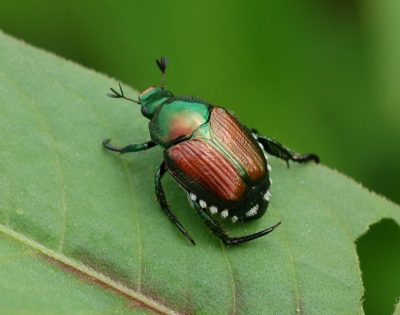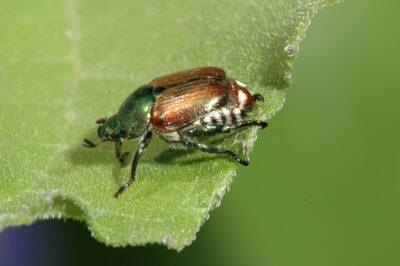One of the biggest horrors for a gardener to face is to come out one morning and see your vegetable plants and roses stripped into scraggly skeletons. The culprit of such disasters often is the Japanese beetle, or Popillia Japonica.
At first, you may be struck with the innocent beauty of this beetle. They are usually about half an inch long, with a metallic blue or green thorax and head, accompanied by shiny tan or copper-colored wings. They lay eggs in the soil around June, and from that, little white grubs will hatch.
Dealing with the Japanese Beetle
They are among the most destructive and devastating insects who feed in groups on garden plants, and can cause garden problems at any stage of their lives. The grub worms feed mostly on roots of seedlings or even grasses. These pretty little beetles are active on sunny, warm days, over a span of around one to two months.
Don’t panic; there are natural and organic ways to thwart these tiny invaders. Let’s take a look at our options. While your first thought may be to buy traps, keep in mind that they often bring in more beetles than they can trap. The best way to deal with Japanese beetles is to use home remedies or by simply handpicking.
Prevention
Prevention and early detection are always the best way to stop a Japanese beetle invasion.
Learn about the beetles’ favorite plants and weeds and either get rid of them, or at least ensure that they are well away from your vegetable garden. Japanese beetles like bracken, grapevines, smartweed, morning glory, mallow, roses (a big favorite) and elder.
This New All-Natural Fertilizer Doubles Garden Production!
Keep your plants healthy and keep your garden clean. These beetles are attracted to the smell of diseased or ripening fruits and vegetables. Remove any rotting or rotten wood, dead plants and shrubs, as well as any old fruit fallen from trees. Any dead and dry grass also should be removed.
One way to prevent Japanese beetles from even coming into your garden is to make your property less attractive to them. Do this by using nematodes, milky spore or insecticidal soaps.
Hands On
Pick beetles off the plants, or shake them off first thing in the morning. Put them in a bucket of soapy water. (See what you can do with the beetle/soapy water mixture down under “repellants.”)
Use Plants
Grow plants the beetles don’t like. A selection of these plants would include chives, garlic, tansy, catnip, peppermint and rue. Cedar seems to be an effective natural japanese beetle repellant, and cedar oil is easily purchased for use if you are unable to plant any or want it immediately.
Repellants
Repelling Japanese beetles is inexpensive and very easy, but best done early in the beetle season. They send out scouts to mark food before the rest of the group show up to eat. You can watch for these scouts and remove them by hand. Once you remove these beetles from the leaves, place them in a bucket of soapy water (one bucket of water to one-fourth of dish soap) and let them decompose. The smell that results deters the other beetles from eating in the area. The best thing: the smell only bothers other beetles! Leave the bucket for up to three weeks and add to it every few days.
Want The Best Chemical-Free, All-Natural Insecticide — For Your Garden AND Home?
You can always repel these insects by covering your vegetables with nets during the peak beetle season. You can also use natural repellants like castor oil soap, Bt (Bacillus thuringiensis) and milky spore to target grubs.
Here are a couple of simple natural japanese beetle repellant recipes you can make at home …
This one is specifically designed for Japanese beetles:
- Take pieces of cedar and put them into one or two gallon buckets.
- Pour hot water over the cedar until all pieces are totally immersed.
- Soak for 24 hours.
- Pour liquid into spray bottles and spray plants.
Note: You may have to add more cedar to get the mixture just right for your garden.
This recipe is for all bugs. Remember to test on a small area of the plant first to make sure no harm will come to your crop. Spray directly onto the bugs, but avoid spraying during the heat of the day.
- 1 full tablespoon of liquid soap to one-fourth a gallon of warm water
- ground red pepper or garlic 1 tsp
- cider vinegar 1 tsp
Mix together and place in a spray bottle. You can store this in a cool place and use when needed.
Even when the season for Japanese beetles comes to an end, remember that prevention is the best protection. By keeping this in mind, you will be one step ahead of the beetles come next year.
Do you have any tips for fighting Japanese beetles? Share them in the section below:
 Off The Grid News Better Ideas For Off The Grid Living
Off The Grid News Better Ideas For Off The Grid Living





